Android started out as an underdog, as the mobile operating system that nobody took seriously. Big-name tech companies laughed it off and critics said it would fail miserably, but Android proved them all wrong and become the powerhouse that it is today.
Details on how well Android is doing and how popular it is are presented below, alongside a few other interesting facts that you (probably) don’t know about this mobile operating system. Go take a look!
1. Android’s logo is unofficially known as Bugdroid
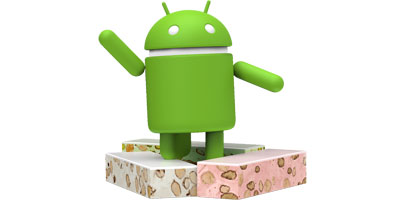
Irina Blok, the designer who came up with Android’s official logo did not give the "little green dude" a name. And neither did Google. Unofficially though, Google’s developers refer to it internally as Bugdroid.
2. Google did not create Android

Android is often presented as "Google’s mobile operating system" and that, in all fairness, is true. But although Google owns and develops Android, Google did not create it. That honor goes to Andy Rubin (pictured above), Rich Miner, Nick Sears, and Chris White.
Back in 2003, they founded Android Inc. and started working on an advanced OS for digital cameras. That’s right, Android started out in life as an operating system for cameras! But that wasn’t to be and just five months later the company decided to ditch the camera OS idea and switch to a handset OS instead.
Android Inc. got off to a rocky start, failing to attract investors and even risking eviction from its office space at one time. But in July 2005 Google intervened and acquired Android Inc. for a reported $50 million. Andy Rubin joined Google after the acquisition and the team he lead came up with what is today known as "Google’s Android mobile operating system."
3. Android 1.0 did not have a dessert codename
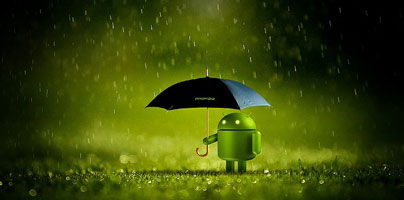
We’re used to Google’s confectionary-themed and alphabetically ordered codenames: Android 4.0 Ice Cream Sandwich, Android 4.1 Jelly Bean, Android 4.4 KitKat, Android 5.0 Lollipop, Android 6.0 Marshmallow, Android 7.0 Nougat.
The thing is that Google didn’t always give Android a dessert codename. Android 1.0 did not have one. Android 1.1 did not have one either, but it was unofficially called Petit Four. The first Android version to get a codename was Android 1.5 Cupcake.
4. Android and the original iPhone were released in the same year
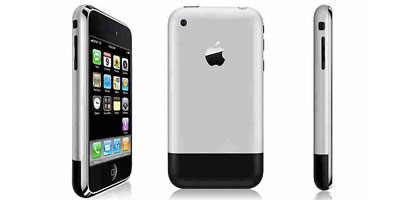
Apple made history when it released the original iPhone in June 2017. A few months later, in November 2007, Google unveiled Android and released a Beta version to the public. While most of the tech world was generally unimpressed with Android, at least one person took notice: none other than the late Steve Jobs.
5. Steve Jobs wanted to destroy Android

For a very long time, Apple’s biggest rival was Microsoft. Both companies developed operating systems, both companies sold desktop computers, so of course they would be rivals (even through Microsoft rescued Apple from going bankrupt). After Apple introduced the iPhone, a new rival emerged: Google.
When Apple was working on the iPhone, Eric Schmidt was Google’s CEO and he was on Apple’s boardat the same time. This means that he was likely privy to Apple’s iPhone strategy and roadmap during the time that Android was in its infancy. When Google unveiled Android in November 2007, just a few months after the original iPhone’s release, relationships with Apple turned sour. In 2010, when HTC introduced an Android smartphone that had many of the iPhone’s features, Steve Jobs got so mad that he threatened to destroy Android.
"I will spend my last dying breath if I need to, and I will spend every penny of Apple’s $40 billion in the bank, to right this wrong," Jobs said. "I’m going to destroy Android, because it’s a stolen product. I’m willing to go thermonuclear war on this."
6. Samsung passed up the chance to buy Android

The tech world is full of stories about big-name companies refusing to buy startups that later became hugely successful. MySpace passed on the chance to buy Facebook, Blockbuster passed on the chance to buy Netflix, and Samsung passed on the chance to buy Android.
As mentioned above, Android Inc. got off to a rocky start and had problems attracting investors. So Andy Ruben when to Samsung and asked them if they’d like to fund his venture. Not only did they say no, they were nasty about it too. This is how Ruben recounts the experience in Fred Vogelstein’s book Dogfight:
"I walk into the boardroom with my entire team – me and six people. Then twenty executives walk in and stand on the other side of the table in the boardroom. We’re sitting down because I wasn’t accustomed to Asian culture and whatnot at the time. Their CEO walks in. Everyone sits only after he sits, like a military tribunal. Then I go into pitch mode. I pitch the whole Android vision to them like they are a venture capitalist. And at the end and I am out of breath, with the whole thing laid out… there is silence. Literally silence, like there are crickets in the room, Then I hear whispering in a nonnative language, and one of the lieutenants, having whispered with the CEO, says "Are you dreaming?" The whole vision that I presented, their response was "You and what army are going to go and create this? You have six people. Are you high?" is basically what they said. They laughed me out of the boardroom. This happened two weeks before Google acquired us. The next day [after the acquisition was announced] a very nervous lieutenant of the CEO calls me up and says, "I demand we meet immediately to discuss your very, very interesting proposal that you gave us [when you were in Seoul]."
8. Microsoft makes money on Android’s success
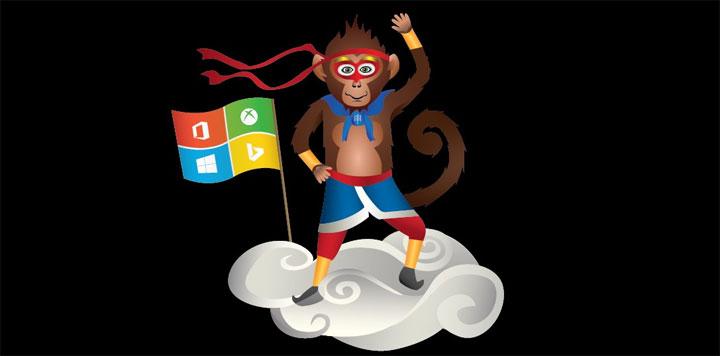
How does Microsoft make money from Android? It can be easily summed up with just one word: patents. Microsoft holds a wide range of patents and that entitles it to strike licensing agreements with companies that use Android. Back in 2013, Samsung paid Microsoft roughly $3.41 per device, which amounted to more than $1 billion. So the better Android does, the more money Microsoft makes. And Android is doing, very, very well.
9. Android has 85% of the smartphone OS market
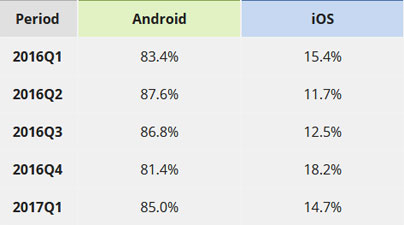
According to IDC, Android currently has 85% of the worldwide smartphone market, iOS has roughly 15%, and Windows Phone… Well, Windows Phone is officially dead, having been discontinued as of July 2017. The newer version, Windows Mobile is still around, but Microsoft doesn’t care about it enough to actually give it any meaningful new features. Rumor has it that Microsoft will put Windows Mobile in maintenance mode until its support ends in November 2018.
10. Android powers 2 billion devices
The Android ecosystem is huge, with the operating system powering smartphones, tablets, smartwatches, smart TVs, and even cars. At I/O 2017, Google’s annual developer-focused conference, the company shed some light on how popular Android really is when it announced that the number of monthly active Android devices has reached 2 billion.
Details on how well Android is doing and how popular it is are presented below, alongside a few other interesting facts that you (probably) don’t know about this mobile operating system. Go take a look!
1. Android’s logo is unofficially known as Bugdroid

Irina Blok, the designer who came up with Android’s official logo did not give the "little green dude" a name. And neither did Google. Unofficially though, Google’s developers refer to it internally as Bugdroid.
2. Google did not create Android

Android is often presented as "Google’s mobile operating system" and that, in all fairness, is true. But although Google owns and develops Android, Google did not create it. That honor goes to Andy Rubin (pictured above), Rich Miner, Nick Sears, and Chris White.
Back in 2003, they founded Android Inc. and started working on an advanced OS for digital cameras. That’s right, Android started out in life as an operating system for cameras! But that wasn’t to be and just five months later the company decided to ditch the camera OS idea and switch to a handset OS instead.
Android Inc. got off to a rocky start, failing to attract investors and even risking eviction from its office space at one time. But in July 2005 Google intervened and acquired Android Inc. for a reported $50 million. Andy Rubin joined Google after the acquisition and the team he lead came up with what is today known as "Google’s Android mobile operating system."
3. Android 1.0 did not have a dessert codename

We’re used to Google’s confectionary-themed and alphabetically ordered codenames: Android 4.0 Ice Cream Sandwich, Android 4.1 Jelly Bean, Android 4.4 KitKat, Android 5.0 Lollipop, Android 6.0 Marshmallow, Android 7.0 Nougat.
The thing is that Google didn’t always give Android a dessert codename. Android 1.0 did not have one. Android 1.1 did not have one either, but it was unofficially called Petit Four. The first Android version to get a codename was Android 1.5 Cupcake.
4. Android and the original iPhone were released in the same year

Apple made history when it released the original iPhone in June 2017. A few months later, in November 2007, Google unveiled Android and released a Beta version to the public. While most of the tech world was generally unimpressed with Android, at least one person took notice: none other than the late Steve Jobs.
5. Steve Jobs wanted to destroy Android

For a very long time, Apple’s biggest rival was Microsoft. Both companies developed operating systems, both companies sold desktop computers, so of course they would be rivals (even through Microsoft rescued Apple from going bankrupt). After Apple introduced the iPhone, a new rival emerged: Google.
When Apple was working on the iPhone, Eric Schmidt was Google’s CEO and he was on Apple’s boardat the same time. This means that he was likely privy to Apple’s iPhone strategy and roadmap during the time that Android was in its infancy. When Google unveiled Android in November 2007, just a few months after the original iPhone’s release, relationships with Apple turned sour. In 2010, when HTC introduced an Android smartphone that had many of the iPhone’s features, Steve Jobs got so mad that he threatened to destroy Android.
"I will spend my last dying breath if I need to, and I will spend every penny of Apple’s $40 billion in the bank, to right this wrong," Jobs said. "I’m going to destroy Android, because it’s a stolen product. I’m willing to go thermonuclear war on this."
6. Samsung passed up the chance to buy Android

The tech world is full of stories about big-name companies refusing to buy startups that later became hugely successful. MySpace passed on the chance to buy Facebook, Blockbuster passed on the chance to buy Netflix, and Samsung passed on the chance to buy Android.
As mentioned above, Android Inc. got off to a rocky start and had problems attracting investors. So Andy Ruben when to Samsung and asked them if they’d like to fund his venture. Not only did they say no, they were nasty about it too. This is how Ruben recounts the experience in Fred Vogelstein’s book Dogfight:
"I walk into the boardroom with my entire team – me and six people. Then twenty executives walk in and stand on the other side of the table in the boardroom. We’re sitting down because I wasn’t accustomed to Asian culture and whatnot at the time. Their CEO walks in. Everyone sits only after he sits, like a military tribunal. Then I go into pitch mode. I pitch the whole Android vision to them like they are a venture capitalist. And at the end and I am out of breath, with the whole thing laid out… there is silence. Literally silence, like there are crickets in the room, Then I hear whispering in a nonnative language, and one of the lieutenants, having whispered with the CEO, says "Are you dreaming?" The whole vision that I presented, their response was "You and what army are going to go and create this? You have six people. Are you high?" is basically what they said. They laughed me out of the boardroom. This happened two weeks before Google acquired us. The next day [after the acquisition was announced] a very nervous lieutenant of the CEO calls me up and says, "I demand we meet immediately to discuss your very, very interesting proposal that you gave us [when you were in Seoul]."
8. Microsoft makes money on Android’s success

How does Microsoft make money from Android? It can be easily summed up with just one word: patents. Microsoft holds a wide range of patents and that entitles it to strike licensing agreements with companies that use Android. Back in 2013, Samsung paid Microsoft roughly $3.41 per device, which amounted to more than $1 billion. So the better Android does, the more money Microsoft makes. And Android is doing, very, very well.
9. Android has 85% of the smartphone OS market

According to IDC, Android currently has 85% of the worldwide smartphone market, iOS has roughly 15%, and Windows Phone… Well, Windows Phone is officially dead, having been discontinued as of July 2017. The newer version, Windows Mobile is still around, but Microsoft doesn’t care about it enough to actually give it any meaningful new features. Rumor has it that Microsoft will put Windows Mobile in maintenance mode until its support ends in November 2018.
10. Android powers 2 billion devices
The Android ecosystem is huge, with the operating system powering smartphones, tablets, smartwatches, smart TVs, and even cars. At I/O 2017, Google’s annual developer-focused conference, the company shed some light on how popular Android really is when it announced that the number of monthly active Android devices has reached 2 billion.

























